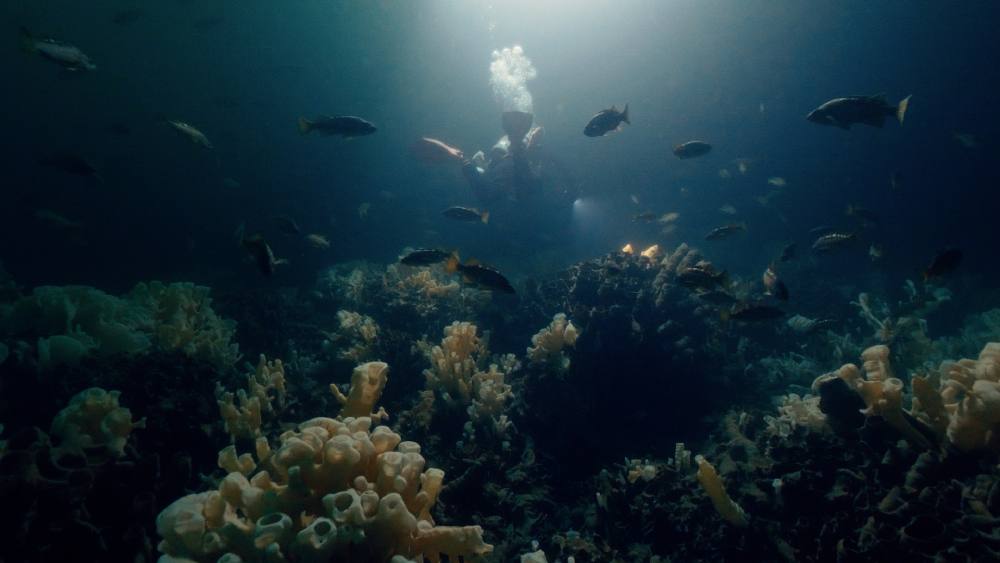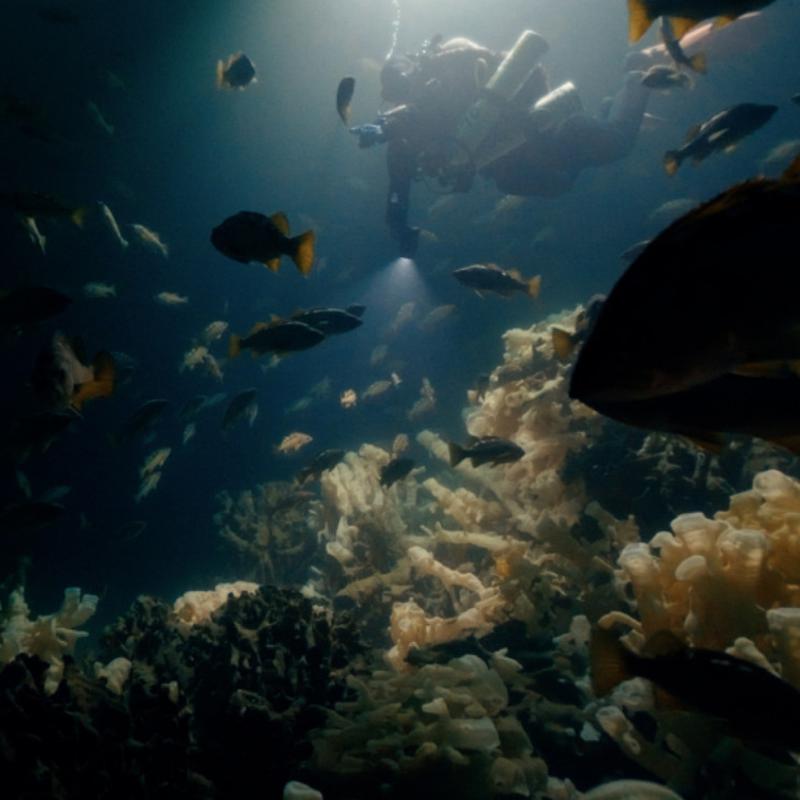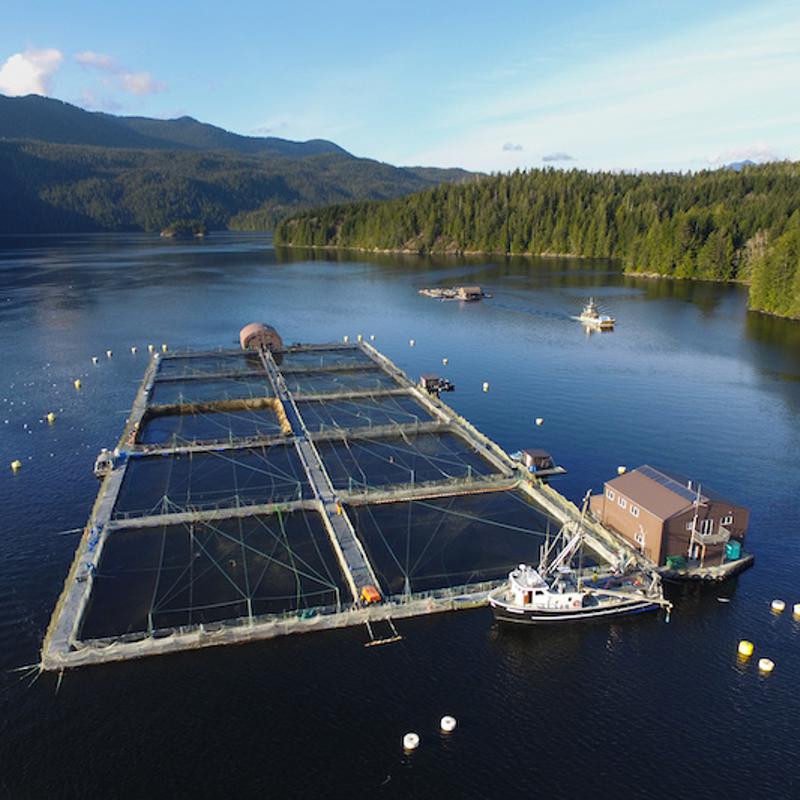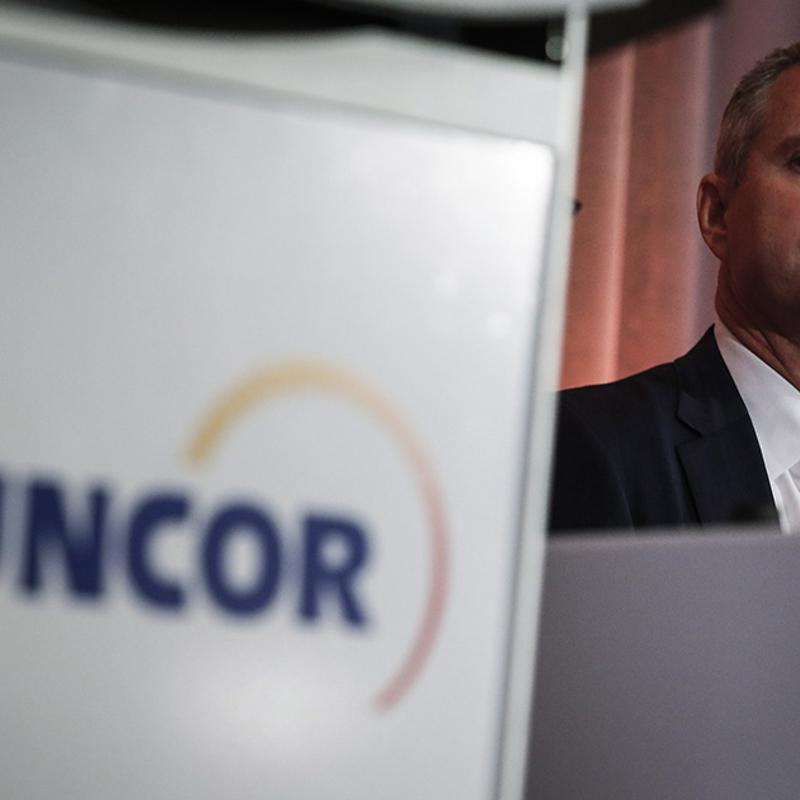ExxonMobil and Chevron gave up exploratory rights after a lawsuit challenged the legality of their permits.
Michelle Gamage
25 Apr 2023
TheTyee.ca
Michelle Gamage is a Vancouver-based journalist with an environmental focus who regularly reports on climate for The Tyee. You can find her on Twitter @Michelle_Gamage.

Michelle Gamage is a Vancouver-based journalist with an environmental focus who regularly reports on climate for The Tyee. You can find her on Twitter @Michelle_Gamage.

Glass sponge reefs create an important habitat for aquatic life. As of Friday these reefs are protected from oil and gas drilling in BC. Image still from Moonless Oasis.
Glass sponge reefs, which are ancient living creatures only found in B.C.’s cold, deep waters are no longer threatened by future oil and gas drilling.
It’s the latest development in a story The Tyee reported earlier this year.
Two multinational oil companies, ExxonMobil and Chevron Canada, have voluntarily given up offshore exploratory oil and gas permits they held in B.C. after the environmental law charity Ecojustice, on behalf of environmental organizations the David Suzuki Foundation and World Wildlife Fund Canada, challenged the legality of the permits.
In July Ecojustice sued both companies and the federal government, claiming the 20 permits held by the companies issued 50 years ago had been given multiple unlawful extensions by the federal government and were no longer valid.
ExxonMobil gave up its permits in March. Chevron gave up the permits named in the lawsuit Friday.
The Tyee is supported by readers like you Join us and grow independent media in Canada
These 20 permits were particularly concerning because they overlapped with areas that are hotbeds of biodiversity and vital ecosystems for a number of different species, according to the lawsuit. Before the lawsuit ExxonMobil held one permit to explore within the Scott Islands marine National Wildlife Area and Chevron held 19 permits to explore the Scott Islands and one permit to explore within the Hecate Strait/Queen Charlotte Sound Glass Sponge Reefs Marine Protected Area.
The Scott Islands are located off the northern tip of Vancouver Island and are a human-free refuge for millions of shorebirds. The HS/QCS MPA protects reefs that are thousands of years old and found nowhere else on the planet. Glass sponge reefs found in the cold waters of the Pacific Northwest suck up and store 227 tonnes of carbon per day as they filter bacteria out of the ocean, marine ecologist Jessica Schultz previously told The Tyee.
In early March ExxonMobil voluntarily gave up all nine permits it held for B.C.’s offshore, including the one that overlapped with the Scott Islands. Chevron gave up the 19 permits named in the lawsuit on Friday.
ExxonMobil was dropped from the lawsuit once it gave up its permits and now that Chevron has also given up its permits the lawsuit has been discontinued entirely, says Ian Miron, a staff lawyer with Ecojustice.
“This results in the outcome we’d asked the court to reach: we had asked the court to say that [Chevron’s remaining] 19 permits were not lawful and to essentially get rid of them,” he told The Tyee.
“We didn’t get the declaration they’re unlawful but we did get rid of them and from an on-the-ground perspective that’s a really big win. It means these two areas are entirely free of oil and gas permits so they can be fully protected from that activity.”
When protection for the Scott Islands and Hecate Strait glass sponge reefs was originally drafted the door was kept open to the possibility of future oil and gas exploratory drilling.
“There was always a chance that the permits could be exercised,” says Hussein Alidina, lead specialist in marine conservation with World Wildlife Fund Canada, which has been working to get rid of offshore oil and gas permits for 20 years.
Friday’s update “removes any risk of that,” Alidina adds.
This is good news for the glass sponge reefs and the five islands that make up the archipelago of the Scott Islands, but it doesn’t get rid of the “lurking threat” of future oil and gas drilling in B.C., Miron says.
There has been a federal moratorium on offshore exploration in B.C. since 1972, but a moratorium is not legally binding and could be lifted in the future.
Oil and gas companies, including Chevron, still hold permits that could one day allow them to do offshore drilling in B.C., Miron says. It’s not entirely clear how many permits still exist but Miron estimates the number is around three dozen.

These Rare and Beautiful BC Reefs Fight Climate Change
Glass sponge reefs, which are ancient living creatures only found in B.C.’s cold, deep waters are no longer threatened by future oil and gas drilling.
It’s the latest development in a story The Tyee reported earlier this year.
Two multinational oil companies, ExxonMobil and Chevron Canada, have voluntarily given up offshore exploratory oil and gas permits they held in B.C. after the environmental law charity Ecojustice, on behalf of environmental organizations the David Suzuki Foundation and World Wildlife Fund Canada, challenged the legality of the permits.
In July Ecojustice sued both companies and the federal government, claiming the 20 permits held by the companies issued 50 years ago had been given multiple unlawful extensions by the federal government and were no longer valid.
ExxonMobil gave up its permits in March. Chevron gave up the permits named in the lawsuit Friday.
The Tyee is supported by readers like you Join us and grow independent media in Canada
These 20 permits were particularly concerning because they overlapped with areas that are hotbeds of biodiversity and vital ecosystems for a number of different species, according to the lawsuit. Before the lawsuit ExxonMobil held one permit to explore within the Scott Islands marine National Wildlife Area and Chevron held 19 permits to explore the Scott Islands and one permit to explore within the Hecate Strait/Queen Charlotte Sound Glass Sponge Reefs Marine Protected Area.
The Scott Islands are located off the northern tip of Vancouver Island and are a human-free refuge for millions of shorebirds. The HS/QCS MPA protects reefs that are thousands of years old and found nowhere else on the planet. Glass sponge reefs found in the cold waters of the Pacific Northwest suck up and store 227 tonnes of carbon per day as they filter bacteria out of the ocean, marine ecologist Jessica Schultz previously told The Tyee.
In early March ExxonMobil voluntarily gave up all nine permits it held for B.C.’s offshore, including the one that overlapped with the Scott Islands. Chevron gave up the 19 permits named in the lawsuit on Friday.
ExxonMobil was dropped from the lawsuit once it gave up its permits and now that Chevron has also given up its permits the lawsuit has been discontinued entirely, says Ian Miron, a staff lawyer with Ecojustice.
“This results in the outcome we’d asked the court to reach: we had asked the court to say that [Chevron’s remaining] 19 permits were not lawful and to essentially get rid of them,” he told The Tyee.
“We didn’t get the declaration they’re unlawful but we did get rid of them and from an on-the-ground perspective that’s a really big win. It means these two areas are entirely free of oil and gas permits so they can be fully protected from that activity.”
When protection for the Scott Islands and Hecate Strait glass sponge reefs was originally drafted the door was kept open to the possibility of future oil and gas exploratory drilling.
“There was always a chance that the permits could be exercised,” says Hussein Alidina, lead specialist in marine conservation with World Wildlife Fund Canada, which has been working to get rid of offshore oil and gas permits for 20 years.
Friday’s update “removes any risk of that,” Alidina adds.
This is good news for the glass sponge reefs and the five islands that make up the archipelago of the Scott Islands, but it doesn’t get rid of the “lurking threat” of future oil and gas drilling in B.C., Miron says.
There has been a federal moratorium on offshore exploration in B.C. since 1972, but a moratorium is not legally binding and could be lifted in the future.
Oil and gas companies, including Chevron, still hold permits that could one day allow them to do offshore drilling in B.C., Miron says. It’s not entirely clear how many permits still exist but Miron estimates the number is around three dozen.

These Rare and Beautiful BC Reefs Fight Climate Change
READ MORE
There’s also the permits in the arctic to consider, Alidina says.
“We’re seeing relinquishment but even better would be extinguishment,” he says.
Many oil and gas permits lie within the Northern Shelf bioregion, stretching from northern Vancouver Island to the southern tip of Alaska, Alidina says. This is an area where First Nations, B.C. and the federal government are working on creating a network of Marine Protected Areas.
In early February the federal government said Marine Protected Areas established after April 25, 2019 will have minimum protection standards that prohibit “industrial activities, such as oil and gas exploration and exploitation, mining, dumping and bottom trawling.”
It’s not clear if these minimum protection standards would extinguish existing oil and gas permits or grandfather them in.

Hype or Hope? Can the Blue Economy Transform Coastal Communities?
There’s also the permits in the arctic to consider, Alidina says.
“We’re seeing relinquishment but even better would be extinguishment,” he says.
Many oil and gas permits lie within the Northern Shelf bioregion, stretching from northern Vancouver Island to the southern tip of Alaska, Alidina says. This is an area where First Nations, B.C. and the federal government are working on creating a network of Marine Protected Areas.
In early February the federal government said Marine Protected Areas established after April 25, 2019 will have minimum protection standards that prohibit “industrial activities, such as oil and gas exploration and exploitation, mining, dumping and bottom trawling.”
It’s not clear if these minimum protection standards would extinguish existing oil and gas permits or grandfather them in.

Hype or Hope? Can the Blue Economy Transform Coastal Communities?
READ MORE
Ending the lawsuit before it went to court means “we don’t get to have a court decide whether or not the permits were legally invalid which could have had broader implications for these other permits in the offshore,” Miron says. “That’s a question that will have to be decided another day.”
Jay Ritchlin, the western Canada director for the David Suzuki Foundation, told The Tyee he is “very pleased” that Chevron gave up its permits but adds “we need to get to a spot in society where we realize we don’t need to go and drill for more oil.”
Offshore oil projects pose an “incredible threat to marine life,” and run contrary to advice from the global authority on oil, the International Energy Agency, which said there should be no new fossil fuel projects as of 2021, he says.
For now it’s a good news update for Hamish Tweed, a highly trained diver and citizen scientist who has been working to research and raise awareness about glass sponge reefs for a decade. He even helped create a documentary about them.

What Are Oil Giants Doing to Stop Climate Change? Media Won’t Ask the Hard Questions READ MORE
Tweed says it feels like a “huge relief” to know the Hecate Strait/Queen Charlotte Sound Glass Sponge Reefs Marine Protected Area is no longer threatened by drilling. “I applaud Chevron for doing it,” he adds. “I’m feeling positive that everyone together is taking steps in the right direction to protect these animals today and into the future.”
The Tyee asked Chevron Canada why it gave up the 19 permits and how many permits the company still holds in B.C.
Spokesperson Jennifer Werbicki did not answer the questions but directed The Tyee to the company’s Friday press release, which says the 19 permits covered 5,700 square kilometres which can now be counted towards Canada’s marine conservation targets.
The company says in the release that it has been talking with Natural Resources Canada about “opportunity to contribute to the Government of Canada’s international marine conservation targets” since 2020.
The press release does not mention the lawsuit.
Ending the lawsuit before it went to court means “we don’t get to have a court decide whether or not the permits were legally invalid which could have had broader implications for these other permits in the offshore,” Miron says. “That’s a question that will have to be decided another day.”
Jay Ritchlin, the western Canada director for the David Suzuki Foundation, told The Tyee he is “very pleased” that Chevron gave up its permits but adds “we need to get to a spot in society where we realize we don’t need to go and drill for more oil.”
Offshore oil projects pose an “incredible threat to marine life,” and run contrary to advice from the global authority on oil, the International Energy Agency, which said there should be no new fossil fuel projects as of 2021, he says.
For now it’s a good news update for Hamish Tweed, a highly trained diver and citizen scientist who has been working to research and raise awareness about glass sponge reefs for a decade. He even helped create a documentary about them.

What Are Oil Giants Doing to Stop Climate Change? Media Won’t Ask the Hard Questions READ MORE
Tweed says it feels like a “huge relief” to know the Hecate Strait/Queen Charlotte Sound Glass Sponge Reefs Marine Protected Area is no longer threatened by drilling. “I applaud Chevron for doing it,” he adds. “I’m feeling positive that everyone together is taking steps in the right direction to protect these animals today and into the future.”
The Tyee asked Chevron Canada why it gave up the 19 permits and how many permits the company still holds in B.C.
Spokesperson Jennifer Werbicki did not answer the questions but directed The Tyee to the company’s Friday press release, which says the 19 permits covered 5,700 square kilometres which can now be counted towards Canada’s marine conservation targets.
The company says in the release that it has been talking with Natural Resources Canada about “opportunity to contribute to the Government of Canada’s international marine conservation targets” since 2020.
The press release does not mention the lawsuit.
No comments:
Post a Comment